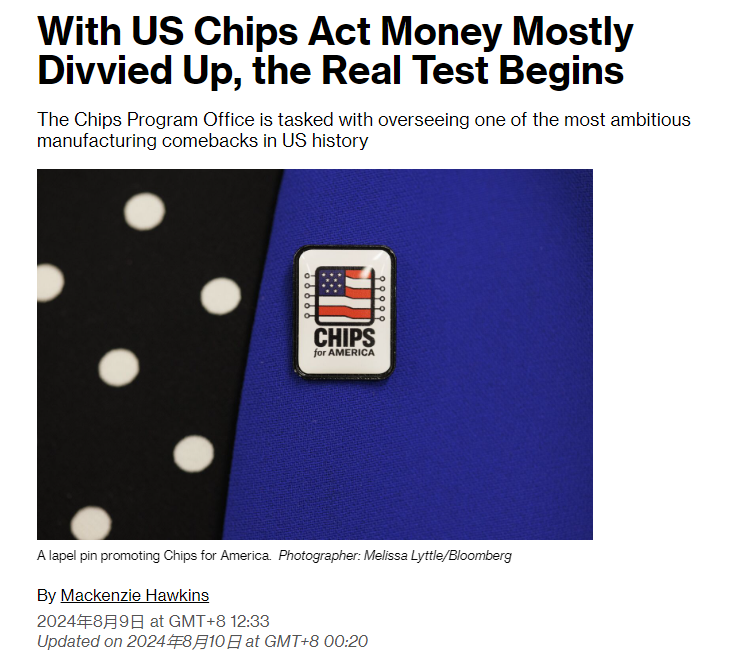The Chips Act's Biggest Beneficiary may be...Intel!
The Biden administration is nearing completion of allocating $39 billion in grants under the CHIPS and Science Act, aimed at revitalizing the U.S. semiconductor industry.
However, the real challenges lie ahead.

1. The CHIPS Act, passed two years ago, is a bold attempt to bring advanced chip production back to the U.S., betting on Intel, Micron, TSMC, and Samsung.
The goal is to produce 20% of the world's most advanced processors by 2030, up from nearly zero today.
2. Key to this effort is Mike Schmidt, who leads the CHIPS Program Office (CPO) at the U.S. Department of Commerce. His team, composed of experts from Washington, Wall Street, and Silicon Valley, aims to reduce reliance on Asia, particularly Taiwan, as chips are essential for everything from microwaves to missiles.
3. The CHIPS Act outlines specific goals and capacity expectations, as shown in the chart. According to BCG forecasts, by 2032, the U.S. is expected to produce about 14% of the world's wafers, up from the current 10%. Without the Act's support, this figure would drop to 8% by 2032.

The immediate priority is to establish at least two major clusters for advanced logic chip manufacturing (the brains of devices). Officials also aim to build large-scale advanced packaging facilities, which are crucial for connecting chips to other hardware. Additionally, they seek to boost the production of traditional chips, as the U.S. is concerned about China's growing capacity in this area. Advanced DRAM memory, essential for AI development, is also a focus.
4. Intel is a major beneficiary of the CHIPS Act, receiving $8.5 billion in direct assistance and $11 billion in support loans from the U.S. Department of Commerce to support its over $100 billion chip investment plan. Intel also stands alone as the sole recipient of a $3.5 billion plan to produce advanced electronics for the military, despite controversy in Washington.
Pat Gelsinger, the CEO of the struggling Intel, has linked his ambitious turnaround plan to the funds from the Chips Act and has called for a “Chip 2.0” expansion. This expansion highlights a massive complex in Ohio, which Intel claims will be the world’s largest chip manufacturing plant, dubbed a “dream site” by President Joe Biden. However, challenges persist, including the state's underdeveloped semiconductor ecosystem, and it's unclear if Intel has secured customers. Despite announcing layoffs and cutting long-cherished dividends, Gelsinger remains committed to Intel's manufacturing roadmap.
Schmidt mentioned this in response to Intel's recent earnings report, emphasizing that the Chips Act includes an insurance policy: companies won't receive funds until specific construction and production benchmarks are met, and the CPO can reclaim funds if projects are never completed. Therefore, Intel’s future remains uncertain, and the U.S. semiconductor roadmap faces challenges.
5. Other chip manufacturers face challenges. TSMC, Intel, and Samsung have committed to investing $400 billion in U.S. factories, but most have missed their targets due to various issues. For instance, TSMC has been reluctant to move its production lines and packaging capabilities from Taiwan, as chip packaging is seen as Taiwan's "trump card" in ensuring U.S. protection.
6. The broader challenge remains workforce shortages. McKinsey estimates that the U.S. semiconductor industry will face a shortage of 59,000 to 77,000 engineers in the next five years. Without immigration reform and a cultural shift toward hardware innovation, the U.S. may struggle to maintain its lead even if it builds new factories.
For individuals, pursuing a two-year technical degree at a community college could be a smart career move, as over 80 semiconductor-related courses have been introduced or expanded since the CHIPS Act was passed.
Disclaimer: Community is offered by Moomoo Technologies Inc. and is for educational purposes only.
Read more
Comment
Sign in to post a comment

Ultratech : spy holds 50 million shares of intel still, nasdaq 82 million. understanding how these etfs work weather you like intel or not they're a big tech company in the revenue producing stage again where you buy with hopes in future become profitable
Fox River :![undefined [undefined]](https://static.moomoo.com/nnq/emoji/static/image/default/default-black.png?imageMogr2/thumbnail/36x36) It will survive unless you give it a banknote printer.
It will survive unless you give it a banknote printer.
105446847rich : go go go can buy call option or put option?
105446847rich : Today's increase is 25; then all net worth is short Kawasaki jae![undefined [undefined]](https://static.moomoo.com/nnq/emoji/static/image/default/default-black.png?imageMogr2/thumbnail/36x36)
Ultratech 105446847rich : condor for intel
101550592 :
10baggerbamm : Intel's dog shit gelsinger is a horrible CEO if you read the requirements of this chips act for The foundry out in California it's a dei woke poster child of a model of inefficiency. it requires 51% of the construction workers be women it sets for the requirement of employees to be hired dei so it has nothing to do with content of character but rather how you identify, sexual preferences. and we all have seen Boeing as a result of dei and woke putting the lives of people on the line because of incompetent employees and upper management. you watch Disney you watched Target Budweiser. Harley Davidson is now another woke company you should see the revolt that took place at Sturgis over Harleys involvement with their rainbow flags up. Intel is fucking garbage the best thing that could happen is gelsinger gets removed and they put a confidence CEO in place and then you know what would happen a Starbucks outcome just like you saw yesterday if you put a competent CEO in place of this failure gelsinger who's 100% sell out to the left. put someone in who knows how to run a business and Intel stock will be 25 to $26 before you blink. of course we know that'll never happen which is why you don't touch Intel with a 10-ft pole
NVDAvsTSLA : Intel is too big to lose money; there are more businesses that lose money than businesses that make money